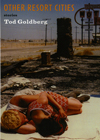Other Resort Cities
In his second collection of short fiction, Tod Goldberg delivers ten seductive stories that target the traumatic reality of failed dreams and the struggle to make amends with the past. Each kinetic story pulses and pops with authenticity. Goldberg has not a word misplaced, often times weaving tragedy and beauty with the result of heartbreaking height, similar in style to Mark Richard or Thom Jones. His characters find themselves trapped, whether literally or figuratively – lost in a world where they cannot connect with the projected image of themselves or attain the goal of a satisfied life. In one of the most moving and powerful stories “Walls,” Goldberg navigates the fractured childhood of an unspecified number of siblings, using We as the narrator, dissecting their Mother’s sexual relationships to ultimate and devastating effects.
In his second collection of short fiction, Tod Goldberg delivers ten seductive stories that target the traumatic reality of failed dreams and the struggle to make amends with the past. Each kinetic story pulses and pops with authenticity. Goldberg has not a word misplaced, often times weaving tragedy and beauty with the result of heartbreaking height, similar in style to Mark Richard or Thom Jones. His characters find themselves trapped, whether literally or figuratively – lost in a world where they cannot connect with the projected image of themselves or attain the goal of a satisfied life. In one of the most moving and powerful stories “Walls,” Goldberg navigates the fractured childhood of an unspecified number of siblings, using We as the narrator, dissecting their Mother’s sexual relationships to ultimate and devastating effects.
Humor plays a big part in Goldberg’s prose too, most effectively in “Mitzvah,” a Distinguished Story in the new Best American Mystery Stories collection, where Las Vegas mobster Sal Cuperine poses as Rabbi David Cohen, man of the cloth and a man of the gun. Goldberg plays well with juxtaposition, pitting his fractured characters against impossible reality, such as in “Living Room,” where a man avoids dealing with the loss of his family by redesigning the living room of his suburban cul-de-sac home to not only look like a Starbucks, but actually be a Starbucks, stocking it with all the authentic amenities – coffee and food, even an a full-time employee; or in “Will” where a prodigal son, in order to receive his inheritance, must set out to meet his dead father’s demands of having his ashes spread along the first base line of the Seattle Kingdom, which was demolished years ago.
What are the most impressive, and certainly an indication of a new creative direction for Goldberg, are the stories “Palms Spring” and the title story “Other Resort Cities.” In these, we meet Tania, a Las Vegas cocktail waitress, painfully reliving and retelling the story of adopting a Russian child, Natalya, as a means to drastically create a new life for herself. What makes these two stories tent poles of the collection is that they are the first time we see Goldberg explore a single female point-of-view. The storytelling and pacing of these is firmly the work of a mature writer breaking into new and uncharted territory. Goldberg’s love for Tania is so palpable that she nearly walks off the page to take our drink order.
Other Resort Cities is home to a tragic population: children and police, drug dealers and teachers, baristas and lawyers, rabbis and gangsters, fuck-ups and failures. Goldberg continues his examination of the human condition, detailing the struggle between a corporeal existence versus an ethereal wane, with each character asking the questions: is this really my reality or have I simply dreamed the whole damn thing? Sadly, though, in “Walls” Goldberg gives us the answer – “there isn’t a way for memory to freeze the body like it freezes trauma in place.”





